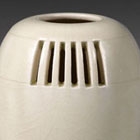J.J. Lally & Co., Oriental Art / New York City, New York
MenuPast Exhibition
Chinese Ceramics in Black and White
March 20–April 10, 2010
8.
AN OPENWORK GLAZED WHITE STONEWARE CENSER
Sui Dynasty (A.D. 581– 618)
of beehive shape, pierced with three clusters of six vertical slots very neatly cut and symmetrically arranged high on the plain steep sides between lightly incised line borders, the domed top with a rimless circular aperture in the center encircled by another lightly incised line border, the pure white stoneware covered with a transparent glaze, pooling at the lower edges of the pierced slots and around the outer rim of the base to a glassy pale greenish tone and showing some light crazing throughout, the smooth flat base unglazed.
Height 3 inches (7.6 cm)
A similar glazed white stoneware censer is illustrated by Krahl, Chinese Ceramics from the Meiyintang Collection, Volume Three (II), London, 2006, p. 380, no. 1381, attributed to the Sui dynasty, Hebei province.
Another smaller white stoneware censer of very similar form with transparent glaze of pale greenish tone, excavated from the tomb of Li Jingxun (d. A.D. 608) at Xi’an, Shaanxi province is illustrated in Tang Chang-an chengjiao Sui Tang mu (Excavation of the Sui and Tang Tombs at Xi’an), Beijing, 1980, pl. XVI-2. The same censer is also illustrated in Qiannian Xingyao (Xing kiln in its Millennium), Beijing, 2007, p. 194.
A straw-glazed pottery censer of larger size pierced with foliate roundels between the clusters of pierced slots, from the Avery Brundage Collection, now in the Asian Art Museum, San Francisco, is illustrated by He Li in Chinese Ceramics: The New Standard Guide, London, 1996, pl. 127, where the author notes the aristocratic practice of fumigating clothing by the use of censers. A straw-glazed pottery tomb figure of a female attendant holding a domed and slotted censer, also from the Avery Brundage Collection and now in the Asian Art Museum of San Francisco is illustrated by He Li, ibid, pl. 129.
Another pottery tomb figure of a female attendant holding a censer of similar form, discovered near Sha Chang, Yube, Anyang in the tomb of Zhang Sheng, dated to A.D. 595 is illustrated by Tregear (ed.), Arts of China, Neolithic Cultures to the Tang Dynasty—Recent Discoveries, Tokyo, 1968, p. 184, fig. 352.
隋 白瓷香薰 高 7.6 厘米
